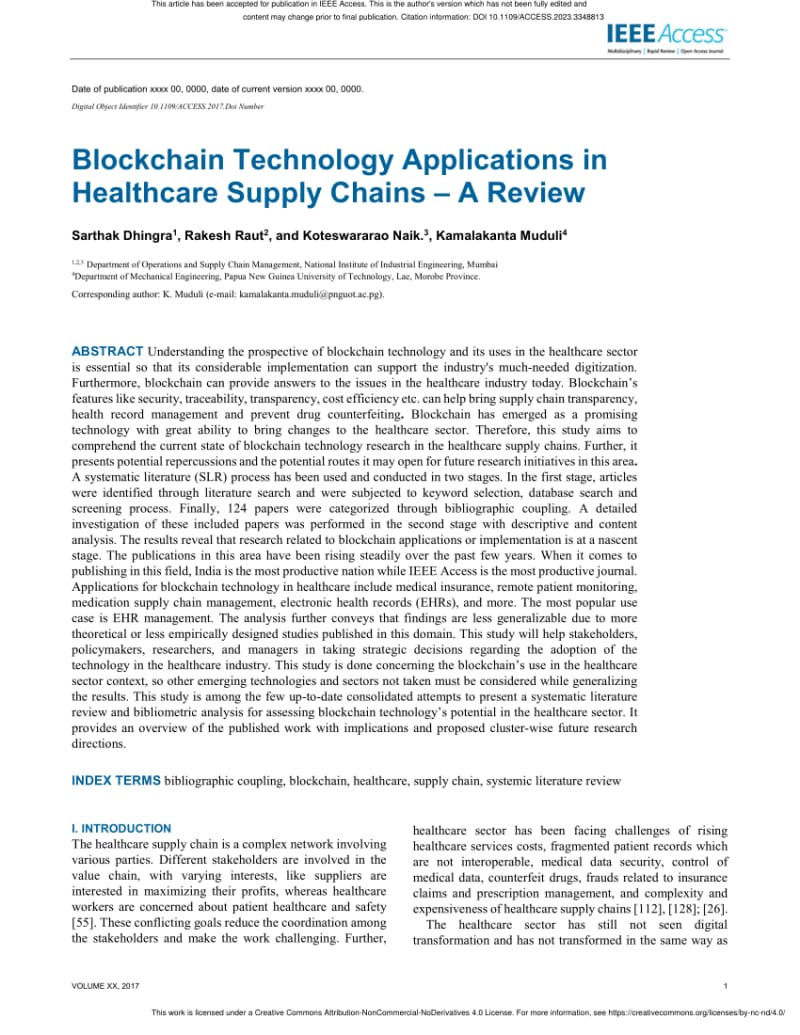Blockchain Technology Applications In Healthcare An Overview – Market size, stock and trend analysis in healthcare in the network type (private, public), after end consumption (provider, payer), after registration, according to field and forecasts of the segment, 2024-2030
The global blockchain technology in the size of the health market will be estimated at $ 7.04 billion in 2023 and is expected to grow from 2024 to 2030 at 63.3% CAGR. The growing requirement of secure and transparent data management systems has made blockchain attractive for health organizations. The decentralized and real estate of Blockchain guarantees data integrity and reduces the risk of data injuries, which is of crucial importance for the treatment of sensitive patient information. In addition, the increasing demand for efficient and optimized processes in health administration such as billing, claims and supply chain management has led to the acceptance of blockchain to increase operational efficiency.
Blockchain Technology Applications In Healthcare An Overview

Blockchain technology revolutionizes the healthcare system by providing unchangeable patient data dates and ensuring privacy and security. It is important for the operation of electronic health files (Ehrs) and offers a safe and decentralized system for sharing patient data in health service providers. Blockchain also improves the supplychain management for pharmaceuticals and medical devices, improves transparency and enables new models for the delivery and payment of health care. It uses strong cryptographic methods to encrypt every block in the chain, which resistant is resistant to manipulation.
Pdf) Blockchain Technology Applications In Healthcare
Blockchain offers transparency to pursue the data movement and the dissipation of the patient, increase system security and reduce the risks of fraud. According to an article published by PubMed in October 2021, in the USA, the USA The public interest center has noticed that the global turnover of fake medication has exceeded over 75 billion dollars in 2021, which in the last five Years showed an increase of 90%. According to the WHO, 10% of the drugs in the world are fake, about 30% of developing countries. With their quality and purity, these fake drugs are a considerable risk of the physical and mental health of people.
Increased events due to violation of health data lead to the growth of blockchain technology on the health market. Traditional central systems are susceptible to cyber attacks and affect the confidentiality and integrity of sensitive patient data. According to data published by Cyber Security Think Tank Cyberpiece Foundation and whether Tobot Infosec Private Limited, the health industry in India was a witness of 1.9 million cybertex in 2022. The report publishes that attackers mainly focus on the absorption of sensitive internet-related systems such as Remote Desk .P Protocol (RDP), sensitive server news blocks (SMB), database services and old Windows server platforms.
The innovation in blockchain technology on the health market is significantly higher. Blockchain basically changes storage, management and release of the healthcare system. Innovations such as intelligent contracts, decentralized data storage and extended security protocols take into account the continuing challenges such as data interior operability, privacy of patients and fraud fraud. For example, in March 2023, Solv.Kare started care. Chen, health class -2 decentralized blockchain infrastructure. The chain offers an open network architecture worldwide, with which all participants in the health ecosystem on a peer-to-peer basis with transparency, trust and safety are made possible on a peer-to-peer basis.
The fusion and acquisition (M&A) rise in the Blockchain Technology Healthcare market. Since the technology and its advantages are clear, the more common health and technology companies receive small, innovative blockchain startups to improve their skills and competitive edges. For example, Solv.Kare worked with decentralized health documents Access (Dehra) in July 2023, which facilitates the implementation of clinical studies and improves its accuracy and consequences.
Blockchain For Healthcare: Benefits And Use Cases
Rules have a significant impact on the introduction and implementation of blockchain technology on the health market. Regulatory framework conditions such as the USA in health insurance insurance and liability (hipaa) and the General Data Protection Ordinance (GDPR) In Europe, strict data protection and security standards must be completed of data protection and in blockchain technology. If these rules face challenges, they also offer opportunities for blockchain solutions that comply with these strict standards.
The regional expansion of the Blockchain technology market in healthcare is range from medium to high companies. Companies increase their global presence strategy. This expansion takes place through the need to cover the increasing demand, to earn up -to -see health markets and to promote blockchain technology in the industry. Developed regions such as North America and Europe are often adopted due to advanced infrastructure for health health, regulatory structures and more investments in technology that promote innovations. Cooperation between stakeholders, including health service providers, technology companies, research institutes and regulatory organizations, accelerates more adoption. For example, solve in July 2022. Participated with Amedhealth to integrate his intelligent ring into his blockchain platform in the healthcare system and to expand his business in South Korea.
The main purpose of the study was to examine and implement blockchain technology in order to improve various healthcare applications and to ensure safe, transparent and efficient treatment of medical data.

Blockchain technology offers decentralized, unchangeable warehouses that can take into account critical questions of health care, such as: B. Patient data protection, interoperability and efficient process management.
Blockchain For Healthcare: Use Cases And Applications
Blockchain increases data protection, improves inter -efficiency in various health systems, reduces fraud and trimming management processes. However, challenges such as scalability, regulatory compliance and standardization provisions are pending.
The implementation of blockchain technology in healthcare has improved data integrity, increases the trust of the stakeholder, the administrative costs reduced and improved the results of the patient. Technical and efficient medical data management can revolutionize the technical health industry.
The supply chain management segment is the largest market share in 2023 and is expected to grow on the fastest CAGR in the forecast period. The blockchain technology enables the visibility from the end to the end in the supply chain and enables health authorities to test root, production processes and distribution routes in real time. This transparency helps reduce fraud, reduce the risk of counterfeiting and increase compliance with official compliance. In addition, blockchain trimmed inventory management and logistics, which reduces the inaccuracies and costs associated with manual records and mediators. The ability of Blockchain technology to find a program in each transaction and its source will increase segment growth during the forecast period.
The clinical studies and the Ecoist segment are expected to increase significantly in the forecast period. The advantage of blockchain technology for the management of clinical experimental databases can significantly forward pharmaceutical research and reduce the dependency on the old data management platform. This approach takes into account the various questions of clinical studies, improves your management through regulatory organizations and research institutes and increases the reliability of clinical studies. For example, in September 2022, the Mayo Clinic United has a platform developed by a study on the hypertension study with a multi -lung artery. This platform offers a secure, decentralized ecosystem for data acquisitions, document management, study surveillance and electronic consent, which benefit clinical experimental companies.
Internet Of Medical Things And Blockchain-enabled Patient-centric Agent Through Sdn For Remote Patient Monitoring In 5g Network
The market dominated the public segment and the highest market share was 43.17% in 2023. Public blockchain networks, which are characterized by their open and decentralized nature, offer transparency, security and internal manner – which is very valuable in the health industry. These networks enable all participants to insure and test and test all participants in critical applications such as patient files, supplychain management and clinical studies. The decentralized aspect of public blockchains reduces the risks associated with central data storage, e.g. B. a focal point and the distribution of data. In addition, the transparency of public blockchains promotes responsibility and trust in stakeholders, including patients, health service providers and regulatory organizations. Since the healthcare system prefers more and more data protection, interoperability and efficient management, public blockchain networks stand for their ability to meet these requirements and to carry out their widespread acceptance and market domination.
The fastest CAGR in the private segment is expected to grow by 64.6% in the forecast period. A private blockchain such as a closed network and under the control of a single company refers to a blockchain network that works in a special threshold. The operations are similar to a public blockchain, including linked connectivity and decentralization, but on a small scale. In contrast to public blockchains, private networks are permitted, which limits access to the selected group of verified participants. This controlled environment is well organized with the strict requirements for the privacy and conformity of health care, such as: It is expected that such factors lead to the growth of the segment during the forecast period.
Based on the final use, organic mastical and medical device companies had the highest proportion of 44.55%in 2023. BioFermastical companies are pending with complex supply chains, which often require transparent and safe persecution of medicines and medical devices. Blockchain can rationalize processes, increase transparency and improve efficiency by securing data safely and at the same time maintaining the secrecy of a patient. It also offers encryption, decentralized storage and extended security features such as cryptographic hasation, data protection and authentic access to members of the health professions and researchers. The blockchain integration guarantees public security in quality control methods and fake examinations and promotes market growth for blockchain in biofermastical and medical devices. In January 2022, NHS Wales and Roche Diagnostics worked with Digiferm to use his blockchain platform to use his blockchain platform. The platform enables quick diagnosis, waiting time for short patients, long -lasting procurement guidelines and the acceptable payment structure for the services offered.

The segment that pays for the fastest CAGR is expected to grow in the forecast period. Payments, including insurance companies and government agencies, offer the advantages of blockchain to optimize the company, increase transparency and reduce fraud. The decentralized and immovable skills of the blockchain ensure that all transactions are recorded in detail and that all parties involved can be checked. This transparency helps to eliminate inconsistencies and controversy in connection with billing and claims that are often on topics in the healthcare industry.












